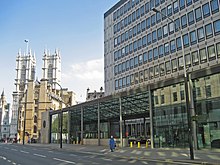Department_for_Energy_Security_and_Net_Zero
Department for Energy Security and Net Zero
UK government department
The Department for Energy Security and Net Zero (DESNZ)[1] is a ministerial department of the Government of the United Kingdom. It was established on 7 February 2023 by a cabinet reshuffle under the Rishi Sunak premiership. The new department took on the energy policy responsibilities of the former Department for Business, Energy, and Industrial Strategy (BEIS).[2]
 Logo | |
 1 Victoria Street, Westminster | |
| Department overview | |
|---|---|
| Formed | 7 February 2023 |
| Preceding Department | |
| Type | UK Government Department |
| Jurisdiction | United Kingdom |
| Headquarters | 3-8 Whitehall Place, London, SW1A 2EG |
| Secretary of State responsible |
|
| Department executives |
|
| Child agencies |
|
| Website | gov |
The department's first Secretary of State was Grant Shapps; he was previously the final Secretary of State at BEIS. The current secretary is Claire Coutinho.
The department is scrutinised by the Energy Security and Net Zero Select Committee.[3]
The department was established on 7 February 2023.
The creation of the new department was described by Downing Street as an opportunity to "focus on giving the UK cheaper, cleaner, more secure sources of energy – cutting bills, cutting emissions, and cutting dependence on international energy supplies."[4]
The London School of Economics's Grantham Research Institute on Climate Change and the Environment welcomed the creation of the new department saying that it "signalled a commitment to delivering net zero" and "showed that MPs on the right of the Conservative Party have failed to win the argument for weakening climate policy." However, the LSE warned that the new department would have to "persuade other departments and the Treasury to accelerate action on cutting greenhouse gas emissions across the economy outside the energy sector" to be effective.[5]
The department's immediate priorities were outlined by the Prime Minister as follows:
- To maintain energy supplies, particularly during the winter.
- To reduce energy bills and lower inflation.
- To ensure the UK is on track to meet its legally binding carbon budgets and Net Zero commitments.
- To speed up significantly the delivery of network infrastructure and green energy.
- To improve the energy efficiency of UK homes, businesses and public sector buildings.
- To deliver a new Energy Bill by the end of the Parliament.[4]
DESNZ ministers are as follows, with cabinet members in bold:[6]
| Minister | Portrait | Office | Portfolio
|
|---|---|---|---|
| The Rt Hon. Claire Coutinho MP | Secretary of State for Energy Security and Net Zero | Overall responsibility for the department. | |
| Justin Tomlinson MP | Minister of State for Energy Security and Net Zero | Energy security, resilience, and preparedness; Energy market reform; Renewables and biomass; Oil and gas; Net Zero Strategy and commitments; Carbon budgets; Green jobs and skills; Trade, net zero investment and supply chains; International climate and energy policy, including G7/G20 and COP negotiations; International climate finance; Carbon leakage; Science and innovation for climate and energy. | |
| Andrew Bowie MP | Parliamentary Under-Secretary of State for Nuclear and Renewables | New nuclear, including small modular reactors, Sizewell C and future GW-scale power plants; Existing nuclear power plants and decommissioning, including geological disposal; Nuclear protection, including regulation and non-proliferation; Nuclear fusion; Energy systems (Grid) and networks. | |
| Amanda Solloway MP | Parliamentary Under-Secretary of State for Affordability and Skills | Energy affordability schemes, including the Energy Price Guarantee (EPG), Energy Bills Discount Scheme (EBSS) and Energy Bills Relief Scheme (EBRS); Energy consumer issues, including pre-payment meters (PPMs); Fuel poverty; Ofgem consumer elements, including the energy price cap (shared with the Minister for Energy Security and Net Zero). | |
| The Rt Hon. Lord Callanan | Parliamentary Under-Secretary of State for Energy Efficiency and Green Finance | Green finance; Energy efficiency and demand reduction; Industrial decarbonisation and emissions trading, including fuel switching, energy efficiency and electrification; Clean heat, including the Boiler Upgrade Scheme; Smart meters; Heat networks; Local authority decarbonisation; Carbon capture, utilisation and storage (CCUS); Hydrogen. | |
- Department for Business, Energy, and Industrial Strategy - preceding body from 2016 to 2023.
- Department of Energy and Climate Change - similar body from 2008 to 2016.
- Department of Energy - historic body with similar responsibilities from 1974 to 1992.
- "Offshore Coordination Support Scheme - GOV.UK". gov.uk. 10 February 2023. Retrieved 10 February 2023.
- "Department for Energy Security & Net Zero". GOV.UK. UK Government. 7 February 2023. Retrieved 8 February 2023.
- Making Government Deliver for the British People: Updating the machinery of government for the world of today and of tomorrow (PDF). UK Government. 7 February 2023. Retrieved 7 February 2023.
 Text was copied from this source, which is available under an Open Government Licence v3.0. © Crown copyright.
Text was copied from this source, which is available under an Open Government Licence v3.0. © Crown copyright. - Ward, Bob. "Response to the creation of the new UK Department for Energy Security and Net Zero". lse.ac.uk. The London School of Economics. Retrieved 8 February 2023.
 This article incorporates text published under the British Open Government Licence: "Our ministers". GOV.UK. Department for Energy Security and Net Zero. Retrieved 28 February 2023.
This article incorporates text published under the British Open Government Licence: "Our ministers". GOV.UK. Department for Energy Security and Net Zero. Retrieved 28 February 2023.
- Official webpage on GOV.UK
- Making Government Deliver: Updating the machinery of government for the world of today and of tomorrow policy paper forwarded by Rishi Sunak explaining the rationale for the department.